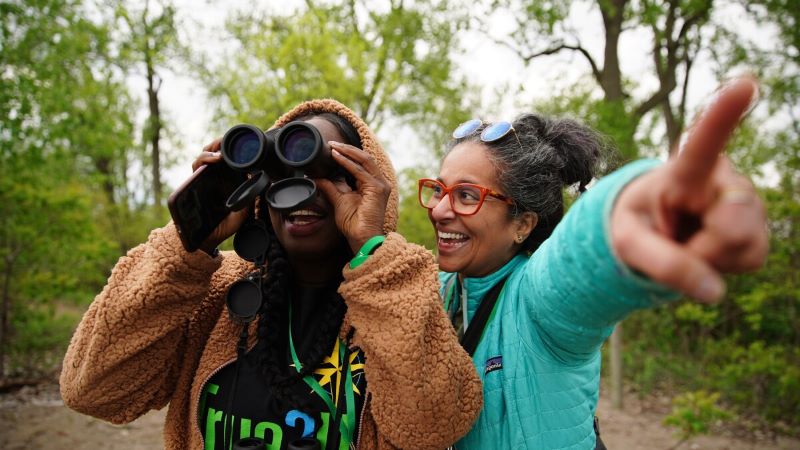A recent study, "Birdwatching linked to increased psychological well-being on college campuses: A pilot-scale experimental…

At Lane County Audubon Society, we love to see our community working together to make a better place for birds, people, and other biological beings. We believe strongly in supporting wildlife while connecting people to nature. One way to achieve this is to help with the creation and maintenance of native plant gardens in our area. This year, we obtained a small grant from National Audubon Society to help fund the improvement of school native plant gardens. An early connection with nature has been shown to promote health and an appreciation for the natural world in children. Our first project is at Adams Elementary School.
Cecelia Hagen, our LCAS Audubon Adventures coordinator, has been instrumental in getting the program going and providing on-the-ground support. At Adams School, the school garden parent coordinator, Angela McDonald, provides assistance and expertise. We held two work parties at the school garden this spring. More are planned for the fall, when we can rely on nature to water what we plant. The spring sessions, focused on weeding out invasive plants and planting some native bloomers, were fun and productive.
 Check out the pictures of our multi-generational volunteers. It was especially gratifying to see children, parents, grandparents, and UO students working together to make it happen. Some of the UO students were from the nascent student bird organization on campus. This group, “Ducks of a Feather,” are also collaborating with LCAS to create bird- and pollinator-themed activity kits for handing out to community children through the Eugene Public Library program. Other UO students were from my conservation biology class, which had a service-learning component that resulted in students helping throughout town. Activities included cleaning up trash along the river, weeding out invasives, and planting native flowers in places such as Alton Baker Park, Hendrick’s Park, Mt. Pisgah, and on campus.
Check out the pictures of our multi-generational volunteers. It was especially gratifying to see children, parents, grandparents, and UO students working together to make it happen. Some of the UO students were from the nascent student bird organization on campus. This group, “Ducks of a Feather,” are also collaborating with LCAS to create bird- and pollinator-themed activity kits for handing out to community children through the Eugene Public Library program. Other UO students were from my conservation biology class, which had a service-learning component that resulted in students helping throughout town. Activities included cleaning up trash along the river, weeding out invasives, and planting native flowers in places such as Alton Baker Park, Hendrick’s Park, Mt. Pisgah, and on campus.
Using native plants in gardens provides many benefits. Birds and pollinators have co-evolved with these plants, creating a win-win situation. The plants provide cover, food, and shelter for the birds and other wildlife. Native bees and birds supported by these gardens are best equipped to provide effective pollination for the plants. Plants that are native to the area are easier to care for. Better suited for the local climate, including our dry summers, they need less watering as well as less application of synthetic chemicals, such as fertilizers and pesticides. The birds and beneficial insects supported by these plants also provide pest control.
We seek volunteers to provide assistance in tending the school gardens and helping kids learn the benefits of bird and pollinator-friendly gardening. This project is part of a wider LCAS initiative to promote a more bird-friendly community. We want to raise awareness about how to best support birds and pollinators and how to reduce bird mortality in our community. There’s so much to do, and we can do it if we work together. Please join us.
Contact Debbie: dschlenoff@msn.com
Bird Friendly Gardening Tips
-
Plant native plants for food and cover
-
Plant native blooming flowers that attract butterflies, bees, and hummingbirds
-
Plant berry-producing plants, fruit trees, and nut trees
-
Have a diversity of plants at different heights and that bloom throughout the season
-
Use alternatives to pesticides
-
Leave snags
-
Create brush piles and old log or wood piles
-
Have a rock pile with larger rocks that have spaces between them
-
Reduce or eliminate lawns
-
Leave some grassy areas unmowed
-
Leave some bare patches for ground-nesting solitary native bees
-
Have a messy yard and garden
-
Create one or more water features for wildlife drinking and bathing
-
Keep your cat indoors
-
Clean bird feeders



